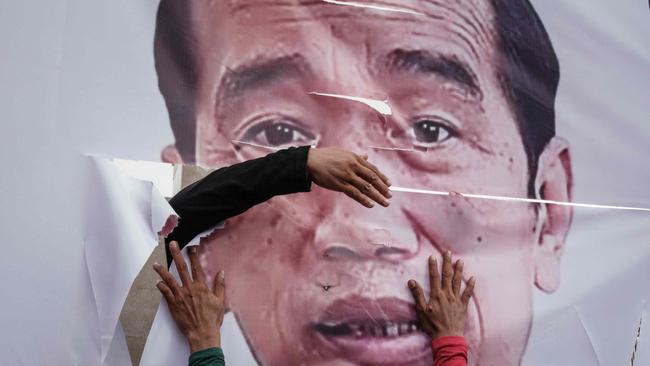Jokowi political vehicle accused of electoral fraud
Indonesian opposition forces are pushing for an inquiry over Joko Widodo’s alleged use of state resources to help Prabowo Subianto.

Indonesian opposition forces are pushing for a parliamentary inquiry into electoral fraud over President Joko Widodo’s alleged use of state resources to help election winner Prabowo Subianto, with questions also being raised over the integrity of the ongoing formal vote count.
Political supporters of Mr Prabowo’s rival candidates, Anies Baswedan and Ganjar Pranowo, are lobbying for a probe into allegations that the election was tainted by voter intimidation, misuse of state resources, including social assistance, and manipulation of state institutions – claims Jokowi has repeatedly denied.
Quick counts conducted on the night of the February 14 election show Mr Prabowo and his running mate, Gibran Rakabuming Raka, Jokowi’s eldest son, captured close to 60 per cent of the votes in a landslide first-round victory but both rival candidates are refusing to concede defeat amid claims that millions of voters were swayed by the deployment of state resources, and at least five parties – including the Indonesian Democratic Party of Struggle (PDIP) that backed Jokowi’s presidency but nominated Mr Ganjar as his successor – say they back an inquiry.
In recent days, concerns have also been raised over a “statistically impossible” precipitous rise in the national vote haul for the Indonesian Solidarity Party (PSI), chaired by Jokowi’s youngest son and for months touted as a post-presidential vehicle for the outgoing leader who lacks a party through which he can maintain political influence.
For the PSI to have any political sway, it must pass a 4 per cent vote threshold required to secure seats in parliament, which it was considered highly unlikely to do, given quick counts from 12 different institutions estimated a final national vote haul for it of 2.78 per cent.
Suspicions were aroused when the PSI’s vote count shot up from 2.55 per cent to 3.13 per cent on a vote count of just 1.7 per cent over three days last week.
Burhanuddin Muhtadi, chief executive of respected polling house Indikator, told The Australian that while a final 3.13 per cent haul was within the 1 per cent margin of error, such a steep rise could not occur on such a small increase in votes counted.
“It is statistically impossible from just a 1.7 per cent increase from the total votes entered into the recap system,” he said, given the party would have to have averaged 50 per cent of the vote in each polling station counted during that period.
Both the Indonesian election watchdog Bawaslu and the election committee have dismissed concerns over the anomaly, and in a joint statement released this week blamed errors in the Sirekap system that scans ballot papers. The final result was determined not by the Sirekap system but through a manual count subjected to several levels of monitoring, they added.
Sceptics have pointed to the fact those technical difficulties appeared only to affect the PSI and Gelora, both minor parties within the Prabowo coalition.
Suspicions were compounded Tuesday when the Election Committee removed vote counts and data analysis from its website, making it all but impossible for independent experts to analyse poll data before final count results are due on March 20.
The PSI also issued a statement denying any vote fraud and accusing critics of “trying to manipulate public opinion by questioning” the results.
The party remained “optimistic about passing the parliamentary threshold”, it added.
Seth Soderberg, an election data analyst with SNS Analytics, said it was “possible for a party’s vote to jump up a few tens of thousands because the district reporting could be one in which they have very strong support. But PSI numbers were big even for that.”
The PSI burst on to the election scene ahead of the 2019 elections. Within weeks of failing to reach the 4 per cent vote count, it had joined the ruling coalition as Jokowi’s most enthusiastic cheerleader. His youngest son Kaesang was installed as chairman last September, two days after joining the party.



To join the conversation, please log in. Don't have an account? Register
Join the conversation, you are commenting as Logout